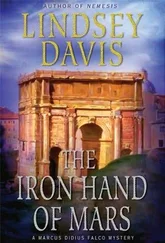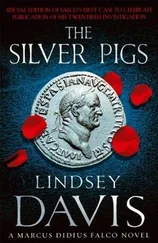Lindsey Davis - The Ides of April
Здесь есть возможность читать онлайн «Lindsey Davis - The Ides of April» весь текст электронной книги совершенно бесплатно (целиком полную версию без сокращений). В некоторых случаях можно слушать аудио, скачать через торрент в формате fb2 и присутствует краткое содержание. Год выпуска: 2013, ISBN: 2013, Издательство: Minotaur Books, Жанр: Исторический детектив, на английском языке. Описание произведения, (предисловие) а так же отзывы посетителей доступны на портале библиотеки ЛибКат.
- Название:The Ides of April
- Автор:
- Издательство:Minotaur Books
- Жанр:
- Год:2013
- ISBN:9781250023698
- Рейтинг книги:3 / 5. Голосов: 1
-
Избранное:Добавить в избранное
- Отзывы:
-
Ваша оценка:
- 60
- 1
- 2
- 3
- 4
- 5
The Ides of April: краткое содержание, описание и аннотация
Предлагаем к чтению аннотацию, описание, краткое содержание или предисловие (зависит от того, что написал сам автор книги «The Ides of April»). Если вы не нашли необходимую информацию о книге — напишите в комментариях, мы постараемся отыскать её.
The Ides of April — читать онлайн бесплатно полную книгу (весь текст) целиком
Ниже представлен текст книги, разбитый по страницам. Система сохранения места последней прочитанной страницы, позволяет с удобством читать онлайн бесплатно книгу «The Ides of April», без необходимости каждый раз заново искать на чём Вы остановились. Поставьте закладку, и сможете в любой момент перейти на страницу, на которой закончили чтение.
Интервал:
Закладка:
"Leave it alone, Albia," Morellus chided, proving my point. "You will only make it worse. The aediles agents are collecting dogs with pointy noses now, to act as understudies. Kindly give up, woman! My children have just acquired a puppy with rusty-coloured fur. While we're having to keep him in so the dog-catchers don't snaffle the poor little beggar, he's peeing on the floor rugs and driving my wife crazy."
I gave him a wry, defeated smile.
The atmosphere on the streets had changed overnight. Visitors flooded into Rome, wandering about the Aventine not so much because it was a cultural high spot for travellers but because the Temple of Ceres stood here, the festival's focal point. Workers were starting their holiday. There were more people than usual even this morning and by tonight everywhere would be packed. Bars were open. Hawkers with trays of dubious snacks were roaming about. Garland-girls sat on kerbs, surrounded by mounds of greenery and flowers that were too heavy to carry. Only the race in the Circus Maximus would suck the neighbourhood dry of crowds again. At that point, Morellus would face double anxiety: needing to police the racetrack down in the valley, yet also to keep watch over homes and businesses on the heights that would fall prey to robbers taking advantage of owners' absence. He was used to it, but he loved complaining.
We stood on a street corner, gossiping. Inevitably, we talked about our big preoccupation, the random killings. He told me there had been no further street attacks locally, or none he knew about. The authorities had brought in extra manpower, to police the crowds. Morellus was not convinced by the gesture. His instinct told him this madman made his moves for some as yet unknown personal motive, which I agreed. Crowds alone would not draw him. Only if someone he already had in his sights went to the racecourse would he go after them. Even then, it would break his pattern, which was to take his victims while they were engaged in the most ordinary daily occupations.
Before we parted, Morellus could not help asking, "So are you having it away with that scroll-shoveller?"
"I might be."
"Bit of a character."
"In vigiles' parlance, that's an insult?"
"Too clever. Cocky. I hate that."
I was hurt that my judgement was being maligned. "You're a misery. He suits me. Andronicus is bright, witty, appreciative-"
"A lightweight." Morellus would not be swayed. He was the worst kind of stubborn, self-opinionated man. "Wandering eyes. I bet he two-times you, gal."
Stubborn myself, I walked off, burying myself in thoughts of work in order to blot out the annoying conversation.
There were two things I wished I had done better in this case. One was to speak directly with Laia Gratiana's maid, Venusia. The other was my mishandled interview with Julius Viator's widow. Finding myself not too far from her parents' house, I went back to revisit her.
Facts: Her name was Cassiana Clara. She had a round face, with solemn eyes, though when she managed the ghost of a smile it was attractive. Neat of figure and well groomed; oils had been lovingly massaged in by maids. Judging by her perfect eyebrows, she tidied away superfluous hair routinely, kept herself nice for the man in her life. There would only be one of course. Well, one at a time. But well-off widows don't stay lonely.
I could imagine that Viator would have been happy when his prospective bride was introduced and he stayed content with the marriage.
His widow was the youngest child of affluent parents, though not so wealthy as her husband's family. Whatever older siblings she had, they were all married and settling down to lead good lives and produce grandchildren, as parents think they have a right to expect. Clara, who had probably always been seen as less reliable just because she was the baby, had now fluttered back home, in grief and in trouble, unsettling everyone and unsettled herself.
I apologised for my abruptness last time. I decided to tell her why, frankly mentioning my own bereavement though I kept quiet about how long ago it was. It gave us a bond. We settled down and talked; she was glad of my company. When you suffer a major loss, people treat it like an illness, even though physically you are undamaged. Cassiana Clara, now loitering as a subordinate in her mother's house, was restricted in her social life. Too sweet to mutter about it, she was secretly bored.
She seemed at ease in my company this time. Any strangeness about being interviewed by an informer and any shock that her husband had been murdered were over. She had had time to think about Viator's death, quietly on her own.
I had anticipated correctly. She had brooded. Then she had been to talk to the slaves who saw her husband that day, in the moments after he came home from the gymnasium. One of them had told her Viator kept slapping at his arm as if he had some irritation; he mentioned that something had scratched him. "Like a fish-hook, the slave told me." Although Clara seemed to believe it, I had doubts about the fish-hook; by design, it would have remained in the flesh. They leave a big and bleeding tear if they pull out. None of our victims had had a mark of that type.
I took the slave's name, though Clara said she doubted he would know much more.
We talked about the redundant slaves and their plight. Cassiana Clara had now seen for herself how anxious they were about their corning fate, a new consideration for this young and privileged matron. She told me she was trying to find positions for as many as possible in homes she knew, rather than have them consigned to the slave market. She knew enough of the world to understand how evil that would be. A few loyal staff were being absorbed into her parents' household, one or two were going to her sister. I could not tell how energetically she had applied herself to this task, but I could see the reallocation of labour gave her an interest. I was surprised a girl with that background did it at all.
I was right about something else: Clara had agreed to be remarried. She was betrothed already to one of the legatees of Viator's estate, an older man; she had met him and thought him good-hearted. It was not my place to feel saddened.
I told her to let him know what she was doing about the slaves. "He will be impressed by your kindness-a good basis for your marriage." She was puzzled. The girl was without guile. "Stand up for yourself, Cassiana Clara. You may be much younger than your new husband, but you want to control the keys to the store-cupboard, not some sneery freedman who has worked there for years. Make it plain that you expect to have your place as the mistress. You want a role. You mean to lead a worthwhile life." She made no response, but I could see the idea seriously taking root.
I asked about her marriage to Viator. She spoke about it openly. Yes, his obsession with exercise had placed limitations on their domestic life, but we agreed there were worse things a man could do. Business affairs can be deadly. Drink is bad. She mentioned gambling as a hideous possibility. I alluded to pornography, though when she blushed I did not stress it. I made sure we discussed these things, hoping in vain for a clue to the motive for Viator's murder.
Then I broached a new subject: "Do you mind if I ask about a particular social occasion? I believe you went to dinner once at the house of a warehouse owner called Tullius and his nephew. The nephew is now a plebeian aedile, though he may not have been then."
A guarded look appeared on Clara's face. She nodded; she said she remembered the dinner. "We went once. It was not long before my husband died." Her husband died last month, or not long before, going by when my family was commissioned for the auction: March, or late February at the latest. "We never went again."
Читать дальшеИнтервал:
Закладка:
Похожие книги на «The Ides of April»
Представляем Вашему вниманию похожие книги на «The Ides of April» списком для выбора. Мы отобрали схожую по названию и смыслу литературу в надежде предоставить читателям больше вариантов отыскать новые, интересные, ещё непрочитанные произведения.
Обсуждение, отзывы о книге «The Ides of April» и просто собственные мнения читателей. Оставьте ваши комментарии, напишите, что Вы думаете о произведении, его смысле или главных героях. Укажите что конкретно понравилось, а что нет, и почему Вы так считаете.












